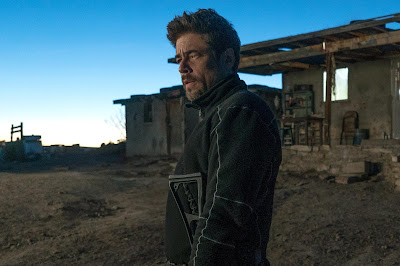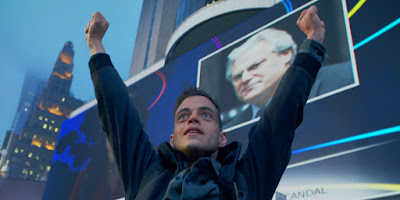Movie Review: Sicario - Day of the Soldado
“This is a land of wolves now.”
The words of Benicio Del Toro’s shadowy operative Alejandro Gillick echoed along the deadly new battleground on which this summer’s Sicario: Day of the Soldado has found itself. The sequel to 2015’s visceral, slow-burning thriller Sicario, the violent ambitions of the mysterious contact that once crossed paths with Emily Blunt’s wide-eyed recruit Kate Macer have evolved further in a fiery voyage towards revenge and retaliation. As Day of the Soldado peeked behind the curtain of not only Del Toro’s mercenary, but also the corrupt inklings of U.S.-Mexico relations, the sequel found solace in brutal violence, hoping to scratch at some semblance of intriguing humanity.
When a series of suicide bombings by Islamic insurgents suddenly find their way onto American soil, the United States government enlists in the help of agent Matt Graver (Josh Brolin) to investigate. When it is discovered that Mexican drug cartels are suspected of transporting these terrorists across the border, Graver seeks the aid of black operative Alejandro Gillick (Del Toro) to ignite war between the neighboring cartels of the country. Staging the kidnapping of the daughter (Isabela Moner) of cartel kingpin Carlos Reyes in an attempt to converge the cartels, Graver, Gillick, and their team soon spark retaliation from the Mexican federal police. As alliances quickly shift, Gillick finds himself desperate to return the girl to safety, all while chaos breaks loose on a volatile hell-scape without rules.
While I was somewhat hesitant to return to the world of Sicario, especially after the first film never truly cemented itself to me as a “classic”, something about venturing back onto the fascinating landscape of the Mexican cartels drew me into Day of the Soldado. As the first film in 2015’s solemn and cinematic Sicario painted a subtle feud between the American and Mexican governments, as Emily Blunt’s eager FBI recruit stumbled onto a larger mystery afoot, its sequel escalated the battle in a number of interesting ways. As the focus of the film centered on Benicio Del Toro’s silent hitman from the first film, as well as Josh Brolin’s head-strong agent in charge, Day of the Soldado sought to traverse a set of story elements that somewhat expanded on the issues teased at in its predecessor.
As the first film set its focus on the drug-fueled economics that lie at the border, one of the most interesting things I found in Day of the Soldado was the other business that contribute to the conflicted relations between the U.S. and its neighbor to the south. Shifting from narcotics to people, the film began with a startling showcase of the terrorism threat that skims the thin border between America and the rest of the world. As radical insurgents slip through the border and onto our door steps, the prologue to the film’s central story presented a compelling focal point for it to delve into those who make their living moving people.
Even while it never took that sophisticated of an emphasis on said business, Day of the Soldado still managed to offer a riveting premise on its own. As the motivations of both Del Toro and Brolin’s leads continued to manifest, tasked with pitting the cartels against each other over the life of a young girl, the film did manage to scratch at the surface of both the political and more personal sides of war. As we found Del Toro’s secretive mercenary carving out a personal vendetta against the cartels, we also saw how Brolin and his own operation swayed in and outside of the law. At the heart of the sequel, amidst numerous gory reckonings in its runtime, was a single question — What has to be done to maintain order and truth in a lawless land?
Among the lawless, the film lent a number of viable performances that contributed to the film’s overall-enthralling premise. As Del Toro led the show with another devious yet compassionate performance as Gillick, his parter-in-crime in Josh Brolin also sold an enjoyable return for his grizzled, laid-back soldier from the first film. Despite the absence of Emily Blunt’s engrossing lead from the first Sicario, the two men, for all their robust testosterone, offered the action-thriller worthy top billing. In what could be a subtle effort to replace Blunt’s emotive performance with another, newcomer Isabela Moner also lent something substantial to the film, as her captive cartel daughter sent up a mature parallel to the hard-edged personas of the leading men.
For all its amped-up cartel violence, Sicario: Day of the Soldado managed to pitch an exciting follow-up to director Denis Villeneuve’s contemplative first film. Where it lacked in cinematic flair and subtle atmospherics, it made up for with thorough performances and a thrilling screenplay from writer Taylor Sheridan. While it might not rival the original on a number of levels, Day of the Soldado worked more to tease at the potential for a dynamic trilogy, where the jarring bloodshed of the cartels is just one layer in a searing look at the corruption and betrayal that lies at the border.
I gave Sicario: Day of the Soldado a 6 out of 10 for its eagerness to propel forward a compelling narrative of cartel conflict, its viable cast in Brolin and Del Toro, and its slim sense of humanity that hopefully gains traction in Part 3.






Comments
Post a Comment